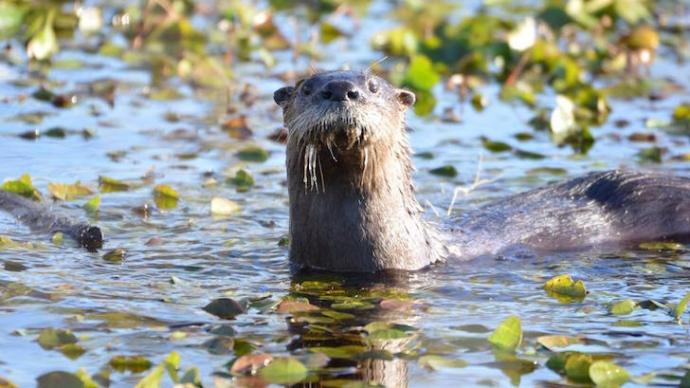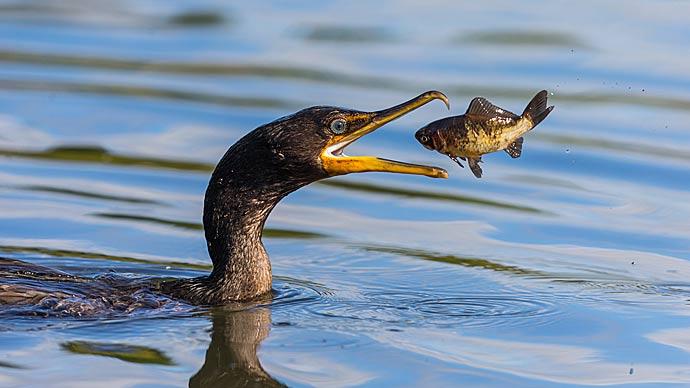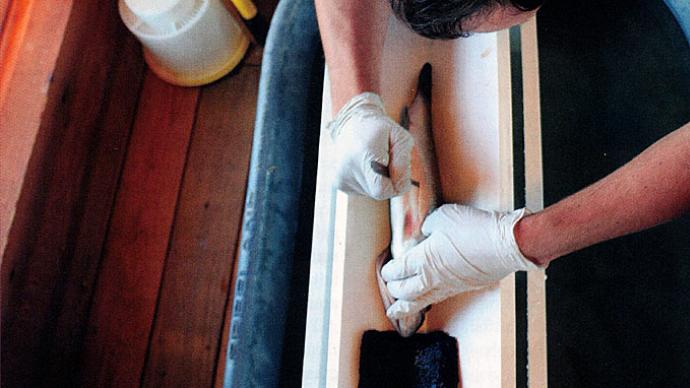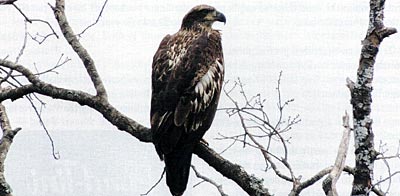
As a rule, most people want to push the limits of their waters, trying to make them perform to their greatest potential. In many cases, people choose to push those limits by aerating, feeding, and fertility.
In those cases, a natural pond environment tends to shift toward a more aquaculture-based management strategy.
Sometimes that works, and sometimes it doesn't.
When we prop up nature, prepare for the unexpected.
Can you increase productivity? Yes, you can. Can you improve your pond's ability to hold fish—its carrying capacity? Yes, you can. Maximize habitat, improve and increase the food chain, add a feeding program, and you'll have more fish. In 99% of the lakes we first consult, food is the number one limiting factor. When you eliminate that factor, the next one becomes water quality. If, by chance, you can eliminate that limiting factor, the next limiting factor becomes the consequence of having way more fish than nature allows.
I call that a pond's bounty.
Two situations immediately come to mind. The first one, Richmond Mill Lake, home of King Fisher Society, is a 125-acre gem nestled in the heart of the sandhills of south-central North Carolina. This lake, finished in 1835, was impounded to corral water to turn a gristmill for the local community. With somewhere between 7,000-10,000 gallons of lousy-quality water flowing over the spillway every day, creating a fishery was a challenge. But, we took that lemon and turned it into a destination with an astonishing fishery. And, that created a whole new set of challenges. With pH of 5.3, the lake couldn't produce a food chain if it wanted to. It hadn't in most of 170 years, so we couldn't expect it. That's why we created a feeding program as the primary source of food for this fishery. The fact that water was constantly flowing over the spillway gave us permission to have an aggressive feeding program. That strategy paid off handsomely, with northern strains of bass pushing upwards of seven and eight pounds, lots of four to six pounders, thousands of bluegills larger than a pound and a half, and hundreds beyond two pounds. There have been three-plus pounders caught.
The standing crop became significant. So did the feed bill.
As the fishery expanded beyond what nature allowed, things began to happen above the water line. The most obvious was when a pair of ospreys showed up and built a nest. They've raised a brood every year since then. That was around 2007. It's fun to watch the ospreys do battle with a pair of bald eagles, which wouldn't be there if not for such a successful bounty of a fishery.
In Year Two of that project we noticed several feeders, all of which sit on expanded aluminum platforms in the lake, going empty too quickly. We thought timers were bad. But, we thought wrong. Onsite personnel set up game cameras and quickly figured out raccoons were swimming to the platforms, spinning the plates and helping themselves to high dollar fish food. Timers were fine, but the raccoons soon weren't. Personnel trapped 98 raccoons in two weeks. The feed bill dropped.
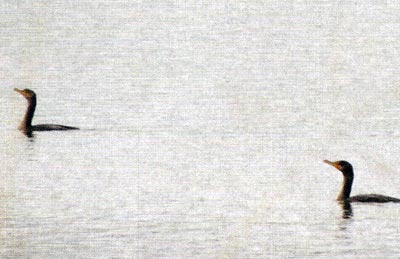
The second story involves one told years ago by a colleague of mine. He renovated Colorado trout streams during his long career. It was expensive work, but it truly improved local habitat that influenced much of the surrounding ecosystems in a healthy way. A wealthy family owned more than two miles of an eroded, silted stream on their legacy ranch. That ranch has been in that family for three generations. It took better than two years to renovate the stream. Care was taken to not disturb soils and figure out how to use high flow rates to rearrange soils to create holes, riffles, and other prime habitat for trout. Once the stream responded to its treatment, trout were stocked. Feeders were employed to help boost local fauna, to provide natural food, and to supplement the fish. After a few years, the family was catching rainbow trout beyond six pounds. Reproduction was documented, and all was well.
On a Sunday morning, the biologist's cell phone rang. The call went something like this, "I'm sitting on the porch, having a cup of coffee. I just watched a bald eagle swoop down, drop his claws and grab a big trout! That fish must weigh at least five pounds." The biologist winced, the hair on his neck stood up, and he braced himself. The landowner then said, "I can remember, when I was a little boy, seeing my first eagle on this ranch. Two years ago, a nesting pair settled on the creek, and built a nest. This is their baby, feeding on this fish. Can you get some more trout?" The man was thrilled to have eagles on his property.
At King Fisher, other predators showed up. Huge flocks of cormorants moved in during migration times. River otters came and feasted. After an exceptionally large rain one summer, an alligator was spotted, seemingly at home. He was migrating through and was gone after a week.
Here's the point. When you push nature to its limits, expect a pushback. Be prepared to deal with predators, whether they're birds, mammals, or amphibians. The only reason Richmond Mill Lake didn't have an abundance of fish-eating snakes is because bass ate the snakes first.
Depending on the region of the world you live, expect predators and be prepared; that's why you need to think about it now. What can you do about them? There are laws and regulations. Some are federal laws, some are state regulations. Your job is to understand the effects of predators and to figure out what to do. The man in Colorado wanted to enjoy the eagles. King Fisher manages predators within the bounds of the law.
Our good friends, Bob and Donna McFarland, the wood duck experts who live in east Texas, enjoyed watching river otters play on their dock—until Bob found a five-pound bass with its guts eaten out, and the rest of the carcass left under the dock to rot and smell up one of their favorite gathering places.
There's a place for all these creatures. You get to choose in your own domain in most cases. You have dominion, which means you also need to understand the cause and effect of nature's ways.
Reprinted with permission from Pond Boss Magazine

